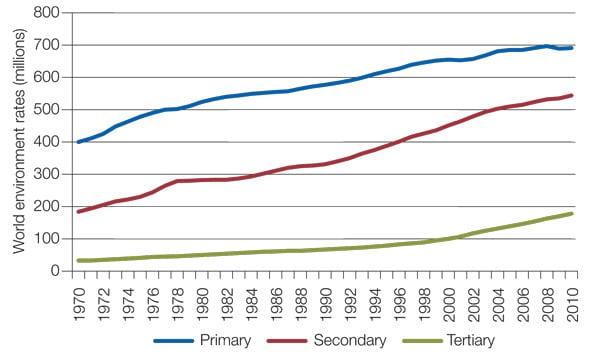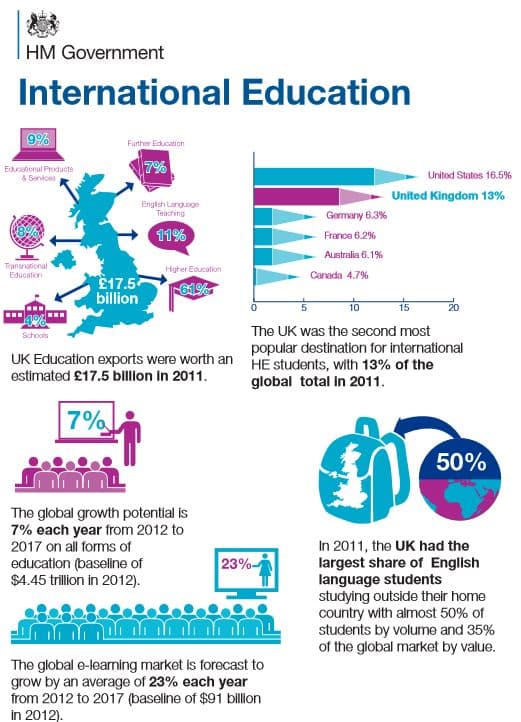New UK strategy aims for 20% growth in international enrolment
The British government released a major strategy for the UK’s international education sector last week – International Education: Global Growth and Prosperity – that describes the dramatic growth in global education markets over the past 40 years, forecasts more growth to come, and sets out an ambitious plan to boost the country’s international education sector.

- “The education sector, including expenditure on national education systems, is currently the second largest sector globally after healthcare."
- "2011 education exports were worth £17.5 billion to the UK economy…In 2011/12 we estimate that overseas students studying at higher education institutions in the UK paid £3.9 billion in tuition fees (net of scholarships) and £6.3 billion in living expenses."
- "75% of our educational export income comes from international students studying in the UK.”

Prepared by the Department for Business, Innovation and Skills (BIS), the report sets out goals and strategies for international student recruitment, transnational education, education technology, partnerships, and branding. Highlights include:
- A plan to grow international enrolment in higher education by 15–20% - that is, by an extra 90,000 students - over the next five years. In support of this goal, BIS anticipates closer coordination among the British Council, UK Trade and Investment, and other stakeholders to promote British education in key target markets (including China, India, USA, Brazil, Mexico, Indonesia, Turkey, South Korea, Russia, and emerging markets within Europe).
It also intends to “explore opportunities to broker new partnerships with countries looking to send large numbers of students to the UK on government scholarships (such as Brazil’s Scientific Mobility scholarship programme) and to support an interdepartmental initiative to promote engagement with “the 200,000 foreign students who graduate from UK universities every year.”
The strategy announces a planned expansion of the Education UK recruitment website operated by the British Council: “An enhanced website will represent boarding schools, English language schools, colleges and universities as well as the UK transnational education market. It will be easier for students to search for courses, institutions and scholarships and to find reputable agents in their own country.”
- The Global Growth and Prosperity report also calls for a renewed commitment to quality controls for offshore programmes operated by UK institutions. As Times Higher Education reported last week:
“Universities that offer courses overseas will be inspected more rigorously to avoid scandals over quality. Speaking at the launch of the strategy in London on 29 July, David Willetts, the universities and science minister, said that oversight ‘needs to be beefed up. There will be a lot of future growth in provision overseas, and I have asked the [Quality Assurance Agency] to make sure it has got the proper regime in place,’ he said. Mr Willetts said that the watchdog would introduce a ‘risk-based’ inspection scheme for overseas courses similar to the approach that will be adopted domestically later this year. The approach sets more frequent or tougher inspections for institutions deemed to be more of a hazard.”
- The strategy features an emphasis on educational technology, and, in particular, on promoting a major new online course delivery platform - FutureLearn - that will launch this fall. The Open University is leading the development of FutureLearn, along with 21 other UK universities, the British Library, the British Museum, and the British Council, along with Dublin’s Trinity University and Australia’s Monash University as international partners.
The UK strategy confirms FutureLearn as an important British counterpart to established American platforms for large-scale online course delivery (MOOCs or Massive Open Online Courses).
- Finally, the UK strategy sets out plans for an expanded effort to support broadly based partnerships in key markets, particularly in “eight priority countries and one region”: China, India, Brazil, Saudi Arabia, Colombia, Turkey, Mexico, Indonesia, and the Gulf. This will include expanded scholarship and student exchange programmes, increased support for education within the UK’s international development initiatives, and “enhanced bilateral knowledge and innovation partnerships” such as the UK-India Education and Research Initiative (UKIERI) and UK-China Partners in Education Programme (UKCPIE).
“It is good that the government has recognised that education could be one of the key growth sectors of the UK economy for the future, and is prepared to support and encourage UK education providers of all types to expand our business,” said English UK Chief Executive Tony Millns. “It is especially good that the English language is an integral part of the strategy, since English is arguably our most successful export ever and a source, along with our education, heritage and culture, of much of the UK’s soft power.” Other observers have wondered if the government’s ambitious strategy for the sector is at odds with more restrictive British immigration policy in recent years and with the continuing debate over immigration targets in the UK today. Interestingly, the Global Growth and Prosperity report appears to anticipate this critique and offers an important signal of the government’s intentions with respect to international students:
“We have reformed the student visa system to ensure that students who are not genuine cannot abuse the system. There remain some misunderstandings about visa rules and post study opportunities to work. We must signal clearly that there is no cap on the number of students who can come to study in the UK and no intention to introduce one. Nor is there any cap on the number of former students who can stay on to work as long as they have a graduate job.”
Universities UK Chief Executive Nicola Dandridge picked up on this critical issue in her organisation’s response to the government strategy:
"It is important and welcome to hear the government state so clearly that genuine international students are welcome in the UK and that there is no cap on numbers. Looking ahead, we would like to see the government go even further in terms of growth. The view in the strategy that the number of international students in higher education can grow by 15-20% over the next five years should be adopted as a cross-government target. The challenge will be to make sure that the UK's student visa rules are properly understood internationally and that international students do not become caught in efforts to bear down on immigration. Visa procedures should be implemented in a way that is consistent with the strategy’s commitment to growing international student numbers. Students and talented academics will go elsewhere if they do not feel welcome.”
As this comment suggests, the success of the government’s new international education strategy may ultimately hinge on its success in harmonising immigration policy and procedures, especially given that international students studying in Britain account for the lion’s share of UK education export revenues.
















